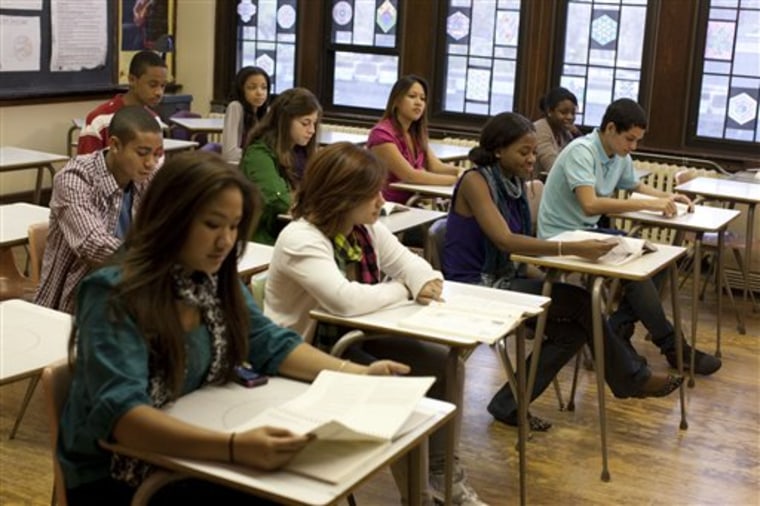Why don't most students' SAT scores dramatically improve the more times they take the test?
A. They don't study hard enough.
B. Their parents don't enroll them in fancy test-prep classes.
C. Most kids who take the SAT twice simply do not see large improvements in their scores.
The correct answer is C, according to the College Board, the nonprofit organization that administers the SATs. And here's the latest development in the debate over whether kids can dramatically improve their scores: The Princeton Review company no longer claims that its "Ultimate Classroom" SAT test-preparation course can boost SAT scores by 255 points.
The National Advertising Division of the Council of Better Business Bureaus, which examines accuracy in advertising, announced May 12 that The Princeton Review would "voluntarily discontinue certain advertising claims, following a challenge by Kaplan, Inc., a competing test-preparation service."
Test-prep solicitations
High school students and their parents are often bombarded with SAT test-prep solicitations as they approach the college application process. Test-prep offers come in the mail; they're sent home by schools, and they're not cheap. (The Princeton Review's "Ultimate Classroom" course costs $1,199 in New York City.) When students take these courses and don't see their scores improve, parents may wonder if their kids studied enough or if they've wasted their money.
Last year, the National Association for College Admission Counseling released a report concluding that test prep courses have minimal impact in improving SAT scores — about 10-20 points on average in mathematics and 5-10 points in critical reading. The NACAC report noted that this evidence is "contrary to the claims made by many test preparation providers of large increases of 100 points or more on the SAT."
Kathleen Steinberg, a spokeswoman for the College Board, says that on average, students who take the SAT test twice only "increase their scores by about 30 points."
She added that "the College Board does not recommend taking the SAT more than twice, as there is no evidence to indicate that taking the exam more than twice increases score performance."
Parents might also be surprised by actual average SAT scores: 501 in critical reading, 515 in math and 493 in writing, according to Steinberg. (The highest score you can get on any section is 800.)
Kaplan charged that The Princeton Review's claims of score jumps were based on comparing the results of Princeton Review "diagnostic" tests with students' self-reported scores on actual SAT exams, as opposed to actual before-and-after SAT scores.
‘We need to be an education company’
Scott Kirkpatrick, president of the test-preparation services division of The Princeton Review, said that the company had been planning to shift away from an emphasis on score improvement independently of the Better Business Bureaus case, and that it is changing its focus to offer a more personalized approach to helping students improve in all areas.
"Score improvement is not our core mission," he said. "I don't want us to be a test-prep company. We need to be an education company."
‘Grossly Bob Schaeffer, public education director for The National Center for Fair & Open Testing, is a longtime critic of both the SATs and the test-prep industry. He thinks most test-prep companies "grossly exaggerate the claims on how much test scores rise on average," but he also disagrees with the NACAC report's conclusion that test prep has a minimal effect. He said that 15 years ago, his organization looked at all the studies that had been done on the subject and found that "good coaching can increase scores between 100 and 150 points."
He also had some practical advice for parents and high school students with SAT jitters. He recommended taking a free sample SAT test online to get a sense of where your baseline score falls, and he said the College Board's own test-prep books and online course offer good preparation for the test as a low-cost alternative to an expensive prep program. (The online course is $70, the book is $22 at CollegeBoard.com.)
He added that there are tricks for doing well on the test that a good coach or the College Board guide can impart. For example, complete as many questions as you can, because there's no penalty for a wrong answer, and know that questions in sections typically go "from least difficult to most difficult, so that an obvious answer at the beginning of a section is correct, but an obvious answer at the end of a section is probably a trick."
Finally, he noted, there are 844 accredited colleges that do not require SAT scores. If your SAT scores are low and they don't go up — which, no matter who you ask, seems to be the case for a lot of kids — those test-optional schools may be the best place for you to apply.
